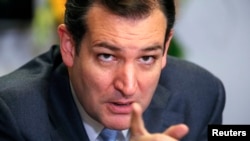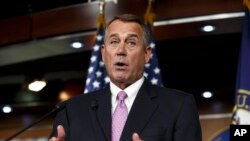WASHINGTON —
At a recent conference marking the Tea Party’s fifth anniversary, Republican Representative Michele Bachmann of Minnesota paid tribute to the grassroots activists who have been a fixture on the U.S. political scene since 2009.
“Because what you did for America is stellar, it was life-changing to the lifeblood of this nation," she said.
The Tea Party’s greatest victory came in the 2010 midterm congressional elections when their supporters helped Republicans take back control of the House of Representatives.
The Tea Party is not a political party but a wide array of grass roots groups, some aided by powerful fundraising organizations. But its supporters now dream of one of their own in the White House someday, and at the top of the list for many is Republican Senator Ted Cruz of Texas, who was elected with Tea Party help in 2012.
“Number one [is] liberty, free market principles, limited government, not bankrupting our kids and grandkids and getting back to the Constitution of the United States of America,” Cruz told conference atendees, referring to Tea Party ideals.
But the Tea Party took a political hit last October in the aftermath of the federal government shutdown. The public blamed Republicans more than Democrats for the stalemate, and many Republican leaders criticized Tea Party groups for a "no compromise" attitude that provoked the shutdown.
Republican House Speaker John Boehner has been critical of well-funded conservative groups who threaten to oppose Republicans in Congress who are not seen as sufficiently conservative.
“I have made it clear that I have great respect for the Tea Party and the energy they have brought to the electoral process. My gripe is not with the Tea Party. My gripe is with some Washington organizations who feel like they have got to go raise money by beating up on me and others," he said.
Democrats, of course, have an entirely different view of the Tea Party movement. Senate Democratic leader Harry Reid of Nevada complains that Tea Party influence within the Republican Party is a major contributor to political gridlock.
“But they are doing everything they can to throw a monkey wrench into any form of government, whether it is local, whether it is state or federal government. That is what it is all about,” he said.
2014 looms as a pivotal year for the Tea Party. Supporters are critical to a strong Republican showing in this November's Congressional election, when the party hopes to hold its majority in the House and gain enough seats to take control of the Senate as well.
The split within the Republican Party between Tea Party supporters and critics will be a factor in 2014, says Brookings Institution political scholar Stephen Hess.
“It seems to be not quite as strong a divide as it has been in the past, but it is certainly there, and in some ways it will never go away. Our parties are not monolithic," he said.
Analysts say far-right Republican Senate candidates nominated with Tea Party support wound up hurting Republican hopes for a Senate takeover in both 2010 and 2012.
Republican strategist Ford O’Connell says party leaders are hoping to avoid that problem this year.
“And the biggest hurdle in front of the Tea Party right now is that they are seen as extremist, and that is exactly how Democrats can continue to defeat Tea Party candidates, because the public perception of the Tea Party is generally seen as a negative thing by the American people,” he said.
The divide between the Tea Party faction and mainstream Republicans is likely be on display two years from now when what is expected to be a large field of Republican candidates, including some Tea Party favorites, begins the quest for the party’s presidential nomination ahead of the 2016 election.
“Because what you did for America is stellar, it was life-changing to the lifeblood of this nation," she said.
The Tea Party’s greatest victory came in the 2010 midterm congressional elections when their supporters helped Republicans take back control of the House of Representatives.
The Tea Party is not a political party but a wide array of grass roots groups, some aided by powerful fundraising organizations. But its supporters now dream of one of their own in the White House someday, and at the top of the list for many is Republican Senator Ted Cruz of Texas, who was elected with Tea Party help in 2012.
“Number one [is] liberty, free market principles, limited government, not bankrupting our kids and grandkids and getting back to the Constitution of the United States of America,” Cruz told conference atendees, referring to Tea Party ideals.
But the Tea Party took a political hit last October in the aftermath of the federal government shutdown. The public blamed Republicans more than Democrats for the stalemate, and many Republican leaders criticized Tea Party groups for a "no compromise" attitude that provoked the shutdown.
Republican House Speaker John Boehner has been critical of well-funded conservative groups who threaten to oppose Republicans in Congress who are not seen as sufficiently conservative.
“I have made it clear that I have great respect for the Tea Party and the energy they have brought to the electoral process. My gripe is not with the Tea Party. My gripe is with some Washington organizations who feel like they have got to go raise money by beating up on me and others," he said.
Democrats, of course, have an entirely different view of the Tea Party movement. Senate Democratic leader Harry Reid of Nevada complains that Tea Party influence within the Republican Party is a major contributor to political gridlock.
“But they are doing everything they can to throw a monkey wrench into any form of government, whether it is local, whether it is state or federal government. That is what it is all about,” he said.
2014 looms as a pivotal year for the Tea Party. Supporters are critical to a strong Republican showing in this November's Congressional election, when the party hopes to hold its majority in the House and gain enough seats to take control of the Senate as well.
The split within the Republican Party between Tea Party supporters and critics will be a factor in 2014, says Brookings Institution political scholar Stephen Hess.
“It seems to be not quite as strong a divide as it has been in the past, but it is certainly there, and in some ways it will never go away. Our parties are not monolithic," he said.
Analysts say far-right Republican Senate candidates nominated with Tea Party support wound up hurting Republican hopes for a Senate takeover in both 2010 and 2012.
Republican strategist Ford O’Connell says party leaders are hoping to avoid that problem this year.
“And the biggest hurdle in front of the Tea Party right now is that they are seen as extremist, and that is exactly how Democrats can continue to defeat Tea Party candidates, because the public perception of the Tea Party is generally seen as a negative thing by the American people,” he said.
The divide between the Tea Party faction and mainstream Republicans is likely be on display two years from now when what is expected to be a large field of Republican candidates, including some Tea Party favorites, begins the quest for the party’s presidential nomination ahead of the 2016 election.
















